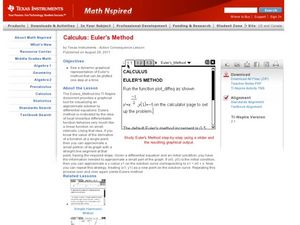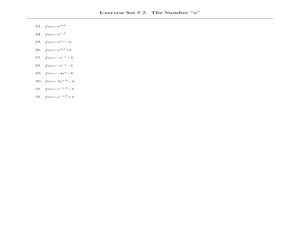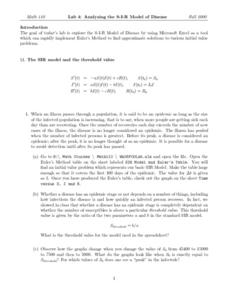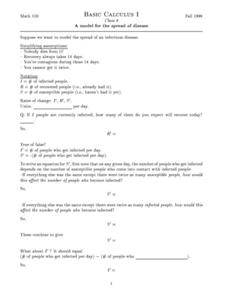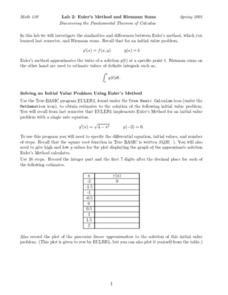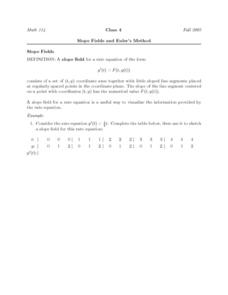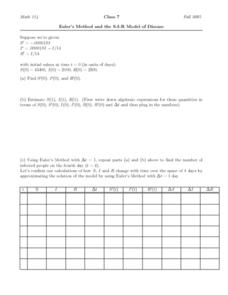Annenberg Foundation
Geometry 3D Shapes: Test Your Skills
Time to find out what they've learned! The final lesson of a five-part series has learners complete a 39-question multiple choice review. They use what they've learned in the previous lessons to complete questions that include concepts...
Annenberg Foundation
Geometry 3D Shapes: Euler's Theorem
How do you get a theorem named after you? Euler knows what it takes! The third lesson of five asks pupils to use an interactive activity to compare the faces, vertices, and edges of seven different three-dimensional solids. They use...
EngageNY
Euler’s Number, e
Scholars model the height of water in a container with an exponential function and apply average rates of change to this function. The main attraction of the lesson is the discovery of Euler's number.
Thomson Brooks-Core
Complex Numbers
A straightforward approach to teaching complex numbers, this lesson addresses the concepts of complex numbers, polar coordinates, Euler's formula, De moivres Theorem, and more. It includes a practice problems set with odd answers...
Chapman University
e Poster
An interesting poster or handout showing Euler's number, e, as the calculated sum of an infinite series. The fractions start out large and gradually get smaller and smaller in both value and size. Shows some of the unique and fascinating...
Curated OER
Euler's Method Introduction
Young mathematicians define and use Euler's method to solve problems in this calculus instructional activity. Learners visualize graphs and solve differential equations. They create these visuals on the TI calculator.
Curated OER
Newton's Law of Cooling
In this Newton's Law of Cooling worksheet, students complete an essay format write up of a convection model. They write the purpose and assumptions of their lab. Students complete three rate of change problems. They describe a model in...
Curated OER
Introduction to Mathematical Modeling
In this mathematical modeling activity, students answer two essay questions. They describe Newton's Law of Cooling by describing and constructing a model and answering seven essay questions about the process.
Curated OER
Euler's Method
In this calculus learning exercise, learners answer 14 short-answer questions regarding Euler's Method, rate equations, initial conditions, and slope functions.
Curated OER
Euler's Method
Learners identify Euler's method of graphing in this calculus lesson. They approximate values of a function and check their work using EM. They also differentiate equations at an exact point.
Curated OER
The Number "e"
In this college level mathematics worksheet, students explore the number e and graph functions involving e. The two page worksheet contains thirty-two problems. Answers are included.
Curated OER
Exponential Equations and Functions
In this college level Pre-Calculus worksheet, students solve problems involving exponential functions. Students determine the domain, range, y-intercept and asymptotes of exponential functions. The three page worksheet contains...
Curated OER
Rate Equation
In this rate equation worksheet, students use Euler's method to estimate the value of rate equations. They use the piecewise linear function approximation to determine the solution of an initial value problem. This two-page worksheet...
Curated OER
Successive Approximations and Euler's Method
In this Euler's method worksheet, students compute the successive approximations for a given function. They compute the piecewise linear function to produce the approximation to the solution of the initial value problem. This four-page...
Curated OER
A Refined Cooling Model
In this cooling model worksheet, students approximate solutions using Euler's method. They approximate piecewise linear equations. This six-page worksheet contains approximately 15 problems.
Curated OER
Practice with Euler's Method
In this Euler's Method instructional activity, students determine the rate of change in given functions They use Euler's Method to approximate the solution of an equation. This two-page instructional activity contains approximately...
Curated OER
A Model for the Spread of Disease
In this model worksheet, students explore a real life scenario to determine the rate at which a disease may spread. They use Euler's Method and the SIR model to determine values at a given point in time. This two-page worksheet...
Curated OER
Quiz 2: Euler's Method and Piecewise Linear Functions
In this linear function learning exercise, students use Euler's method to approximate a solution to an initial value problem. This two-page learning exercise contains three multi-step problems.
Curated OER
Lab 2: Euler's Method and Riemann's Sums
In this Euler's Method and Riemann's Sum worksheet, students identify the best situation in which to use Euler's Method and Riemann's Sum. They identify the initial value of a problem and use the accumulation formula to determine the...
Curated OER
Slope Fields and Euler's Method
In this slope field learning exercise, students use a slope field for a rate equation. Using Euler's Method, they identify the piecewise linear function approximating the solution of the initial value problem. This four-page learning...
Curated OER
Euler's Method and the S-I-R Model of Disease
In this Euler's method worksheet, students determine algebraic expressions for quantities in given terms. Next, they use Euler's Method to identify the information. Lastly, they confirm their calculations through the S-I-R method. ...
Curated OER
Challenge Discussion Sheet 9
In this limits learning exercise, students evaluate five limits using limit definitions. They solve differential equations by isolating one variable. Students determine the dimensions of a rectangle inscribed below the graph of a curve.
Curated OER
Variables and Slopes
In this variable and slopes worksheet, students practice a warm-up activity involving variables V and X and using Euler's Method to solve a value problem.
National Council of Teachers of Mathematics
The Math Forum: Imaginary Exponents and Euler's Equation
"What does it mean to have an imaginary exponent?" This site has an exceptional answer and explains it in two different ways











